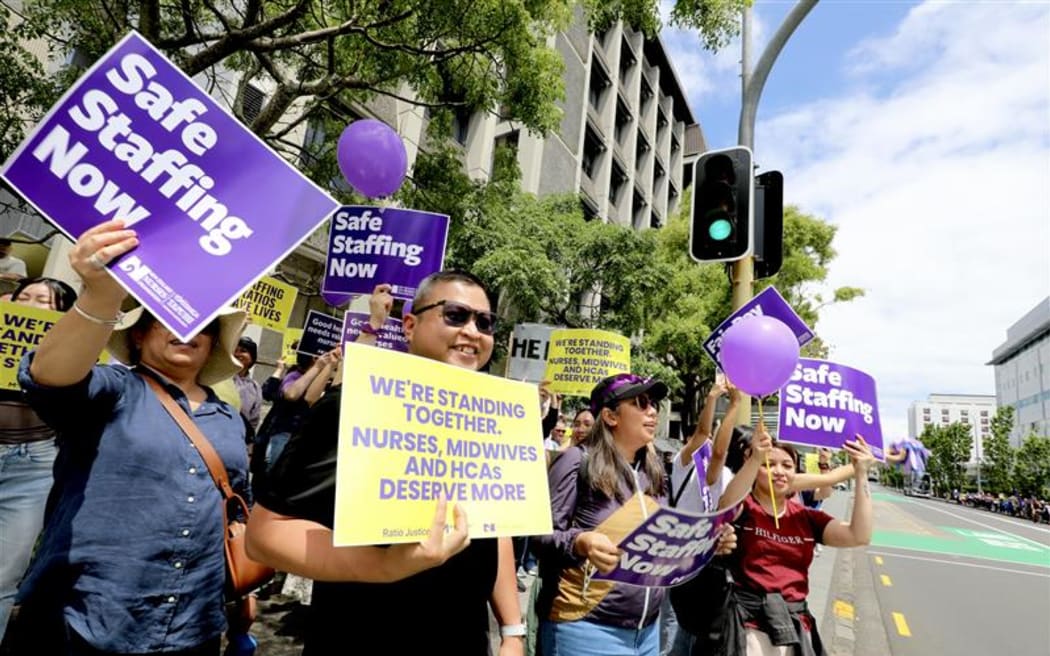
Nurses striking in Auckland on 3 December, 2024. Photo: RNZ / Marika Khabazi
- A nationwide nurses' strike will be held from 9am on Wednesday 30 July until 9am on Thursday 31 July.
- The strike will be a complete withdrawal of labour at every place in New Zealand where Te Whatu Ora provides health care or hospital care services.
- Life preserving services will continue to be provided.
Last-ditch talks between Health NZ and the country's biggest nurses' union on Monday have failed to avert a nationwide strike later this week.
More than 36,000 nurses, midwives, heatlhcare assistants and kaimahi hauora are set to walk off the job for 24 hours from 9am on Wednesday.
Health NZ said the latest bargaining meeting with the Nurses Organisation on Monday had not resolved all the outstanding issues, but there were contingency plans in place to ensure patient safety during the strike.
It estimated about 4300 procedures and specialist appointments would have to be postponed as a result..
NZNO chief executive Paul Goutler said its members were "exasperated" by Health NZ's refusal to acknowledge chronic short-staffing through negotiations, which began last September.
"Short-staffing not only puts patients at risk, it impacts on the number of procedures and assessments hospitals can carry out, adding to wait times.
"Nurses, midwives and health care assistants want to give their patients the care they need, when they need it. Instead they are stretched too thin and their patients are forced to wait for care. This can lead to unnecessary pain and discomfort for patients and heartbreak for their friends and whānau watching them suffer."
There was such a dire lack of health care assistants at Christchurch Hospital recently that whānau were asked to come in and help their loved ones, he said.
NZNO president and Dunedin nurse Anne Daniels said in 45 years of nursing, she had never seen the public health system "in such a state of failure".
"We have far too few nurses to provide safe and timely care. That is hurting our patients, and it is heartbreaking for us to go to work each day knowing that despite all our best efforts there are just not enough of us to stop the escalating avoidable patient harm.
"Nurses are not being recruited to replace those who are leaving in their thousands, and nurses are not being paid competitively to keep them in New Zealand. Our work conditions are desperate, and that takes a toll on us all every day. That's why I am striking."
Health NZ was disappointed at the strike action "when there is a fair offer on the table".
"We are concerned about the impact strike action will have on patients who are waiting for planned care.
"We appreciate it is never an easy decision for any of our nurses to strike. We sincerely thank the nurses who will be delivering life preserving services and all the volunteers who will be supporting our clinical services during the strike period."
It said it was committted to safe staffing and its offer was fair given its financial contraints.
"The offer rejected by the union would see a new graduate nurse on $75,773 gain a total pay increase of $8337 (or 11 percent) by the end of June 2026 once step progression is included. A registered nurse on the highest step with a base salary of $106,739 would see their pay increase by $3224 to $109,963 by the end of June 2026."
The average salary for both senior and registered nurses, including overtime and allowances, was $125,662, Health NZ said.
It's advising patients:
- All emergency departments will remain open for acute care and hospital patients will receive safe care.
- Unless you are contacted directly, please attend any scheduled outpatient appointment or treatment.
- People with non-urgent ailments or injuries should contact their GP in the first instance.
Sign up for Ngā Pitopito Kōrero, a daily newsletter curated by our editors and delivered straight to your inbox every weekday.






